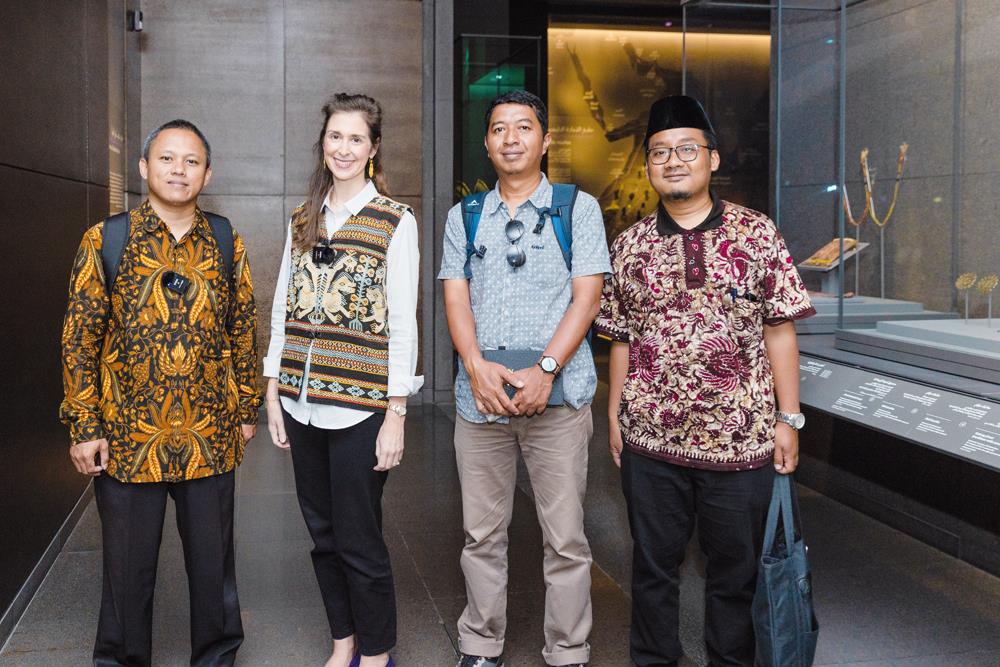
Indonesia's Unesco World Heritage Bid Supported By Years Of Culture
Doha, Qatar: The Years of Culture initiative, an annual bilateral cultural exchange programme, has partnered with the Ministry of Education, Culture, Research, and Technology of the Republic of Indonesia in an effort to preserve and showcase the historical and cultural significance of the Spice Route.
This initiative aims to secure a spot for the Spice Route on Unesco's list of World Heritage Sites, with the goal of amassing sufficient material evidence for submission by the following year.
The Spice Route, an ancient and vital trade network, acted as the lynchpin connecting Nusantara (referred to as the“outer islands” in old Javanese) with regions as India, China, Europe, Africa, and the Middle East. Over the centuries, this network played an instrumental role in shaping global trade, culture, religion, language, art, and cuisine, fostering cultural interchanges along its extensive path.
The initiative was launched with the“Appreciation of the Cultural Actors on the Spice Route” residency programme, which invites scholars to journey through countries along the historic Spice Trade route.
These participants are entrusted with collecting tangible evidence that substantiates the cultural impact of the Spice Route on the countries it traversed, drawing from archaeological discoveries, historical records, and local intangible heritage. The initial phase of the residency has commenced, encompassing three countries, including Qatar. The team includes researchers Idris Masudi, Adimas Bayumurti, Fathurrochman Karyadi, with A. Ginanjar Sya'ban supervising, all from Indonesia.
“Qatar was chosen as one of the first host countries of the residency programme due to its rich collections of cultural artefacts related to Arab culture and history, and deep insights into the historical trade relations between the ancient Arab world and Nusantara,” said Hilmar Farid, Director General of Culture in the Ministry of Education and Culture of the Republic of Indonesia.
“We hope these studies will enrich historical knowledge, enhance understanding, and strengthen its eventual bid for Unseco's list of World Heritage Sites. The residency programme marks a crucial step in safeguarding this invaluable heritage for future generations,” he continued.
A panel talk, held at the Qatar National Library yesterday, featured the research conducted in Qatar to support the Unesco bid for World Heritage Status for the Spice Route. The researchers from Indonesia unveiled their findings after a 38-day research journey.
During the event, Ambassador of Indonesia to Qatar,
H E Ridwan Hassan, expressed Indonesia's eagerness to preserve and highlight the historical and cultural heritage of the Spice Route by proposing it for inclusion on Unesco's list of Intangible Cultural Heritage of Humanity. He extended his gratitude to the Years of Culture initiative, represented by Qatar Museums, for their support, as well as to the Qatar National Library, National Museum of Qatar, and the Museum of Islamic Art for facilitating the residency programme.
“The relationship between the Arab world and Nusantara has a deep historical connection, characterised by centuries of cultural, trade, and diplomatic ties. One of the most significant aspects of their relationship is the ancient Spice Trade route. This maritime network connected the Arab world with Nusantara, facilitating the exchange of valuable spices, such as cloves, nutmeg, and black pepper, as well as other goods,” the envoy said.
Ambassador Hassan added:“The Spice Trade route was not only about the exchange of valuable spices, but also facilitated a significant cultural exchange. Arab traders, who were predominantly Muslims, began to settle in various port cities and trading hubs across the Nusantara region, until Indonesia become the world's largest Islamic country by population.”
Numerous key cultural institutions in Qatar have contributed to the residency programme by granting researchers access to their collections of manuscripts and artefacts.
For example, the National Museum of Qatar, home to a rich collection of items from the Cirebon shipwreck in the Java Sea, provides an exceptional opportunity to study maritime culture and trade relations. And the Qatar National Library offers access to Arabic sources concerning Archipelago Spices, including pre-16th-century accounts from Arab travellers and traders in the Indian Ocean region.

Legal Disclaimer:
MENAFN provides the
information “as is” without warranty of any kind. We do not accept
any responsibility or liability for the accuracy, content, images,
videos, licenses, completeness, legality, or reliability of the information
contained in this article. If you have any complaints or copyright
issues related to this article, kindly contact the provider above.


















Comments
No comment